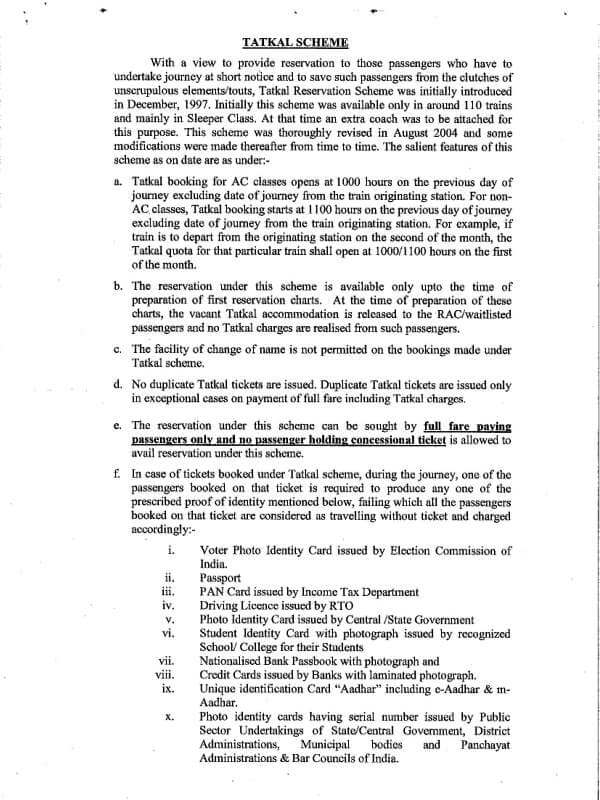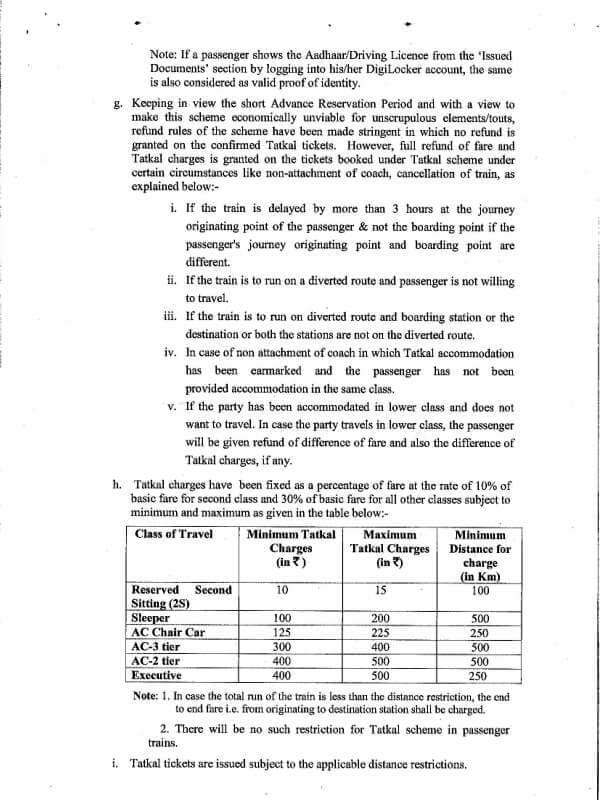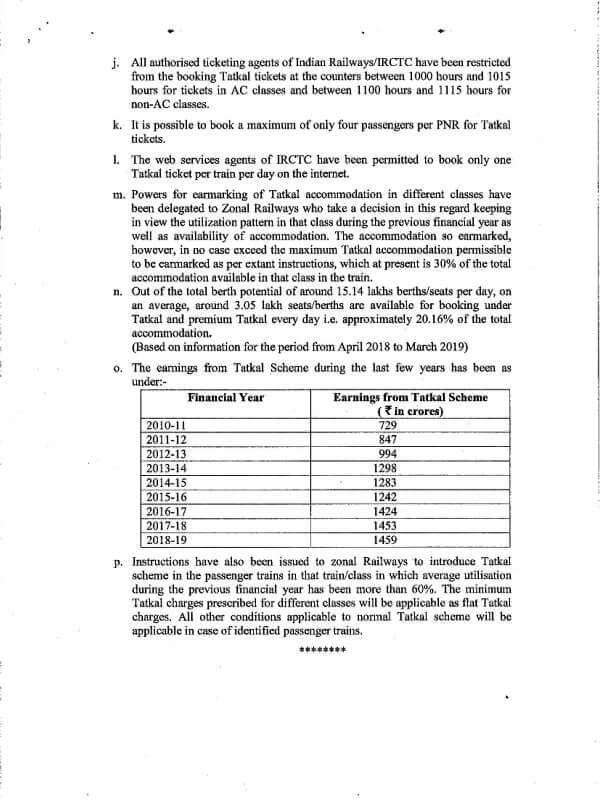Indian Railway Tatkal Reservation Scheme – Aug, 2019: Silent features, Charges, Booking Procedure, Earnings etc.
TATKAL SCHEME
With a view to provide reservation to those passengers who have to undertake journey at short notice and to save such passengers from the clutches of unscrupulous elements/touts, Tatkal Reservation Scheme was initially introduced in December, 1997. Initially this scheme was available only in around 110 trains and mainly in Sleeper Class. At that time an extra coach was to be attached for this purpose. This scheme was thoroughly revised in August 2004 and some modifications were made thereafter from time to time. The salient features of this scheme as on date are as under:-
| a. | Tatkal booking for AC classes opens at 1000 hours on the previous day of journey excluding date of journey from the train originating station. For non AC. classes, Tatkal booking struts at 1100 hours on the previous day of journey excluding date of journey from the train originating station. For example, if train is to depart from the originating station on the second of the month, the Tatkal quota for that particular train shall open at 1000/1100 hours on the first of the month. |
| b. | The reservation under this scheme is available only upto the time of preparation of first reservation charts. At the time of preparation of these charts, the vacant Tatkal accommodation is released to the RAC/waitlisted passengers and no Tatkal charges are realised from such passengers. |
| c. | The facility of change of name is not permitted on the bookings made under Tatkal scheme. |
| d. | No duplicate Tatkal tickets are issued. Duplicate Tatkal tickets are issued only in exceptional cases on payment of foll fare including Tatkal charges. |
| e. | The reservation under this scheme can be sought by full fare paying passengers only and no passenger holding concessional ticket is allowed to avail reservation under this scheme. |
| f. | In case of tickets booked under Tatkal scheme, during the journey, one of the passengers booked on that ticket is required to produce any one of the prescribed proof of identity mentioned below, failing which all the passengers booked on that ticket are considered as travelling without ticket and charged accordingly:- |
| i. | Voter Photo Identity Card issued by Election Commission of India. | |
| ii. | Passport | |
| iii. | PAN Card issued by Income Tax Department | |
| iv. | Driving Licence issued by RTO | |
| v. | Photo Identity Card issued by Central /State Government | |
| vi. | Student Identity Card with photograph issued by recognized School/ College for their Students | |
| vii. | Nationalised Bank Passbook with photograph and | |
| viii. | Credit Cards issued by Banks with laminated photograph. | |
| ix. | Unique identification Card “Aadhar” including e-Aadhar & m-Aadhar. | |
| x. | Photo identity cards having serial number issued by Public Sector Undertakings of State/Central Government, District Administrations, Municipal bodies and Panchayat Administrations & Bar Councils of India. | |
| Note: | If a passenger shows the Aadhaar/Driving Licence from the ‘Issued Documents’ section by logging into his/her DigiLocker account, the same is also considered as valid proof of identity. | |
| g. | Keeping in view the short Advance Reservation Period and with a view to make this scheme economically unviable for unscrupulous elements/touts, refund rules of the scheme have been made stringent in which no refund is granted on the confirmed Tatkal tickets. However, full refund of fare and Tatkal charges is granted on the tickets booked under Tatkal scheme under certain circumstances like non-attachment of coach, cancellation of train, as explained below:- | |
| i. | If the train is delayed by more than 3 hours at the journey originating point of the passenger & not the boarding point if the passenger’s journey originating point and boarding point are different. | |
| ii. | If the train is to run on a diverted route and passenger is not willing to travel. | |
| iii. | If the train is to run on diverted route and boarding station or the destination or both the stations are not on the diverted route. | |
| iv. | In case of non attachment of coach in which Tatkal accommodation has been earmarked and the passenger has not been provided accommodation in the same class. | |
| v. | If the party has been accommodated in lower class and does not want to travel. In case the party travels in lower class, the passenger will be given refund of difference of fare and also the difference of Tatkal charges, if any. | |
| h. | Tatkal charges have been fixed as a percentage of fare at the rate of 10%of basic fare for second class and 30% of basic fare for all other classes subject to minimum and maximum as given in the table below:-
|
|||||||||||||||||||||||||||||
| Note: | 1. In case the total run of the train is less than the distance restriction, the end to end fare i.e. from originating to destination station shall be charged. | |||||||||||||||||||||||||||||
| 2. There will be no such restriction for Tatkal scheme in passenger trains. | ||||||||||||||||||||||||||||||
| i. | Tatkal tickets are issued subject to the applicable distance restrictions. | |||||||||||||||||||||||||||||
| j. | All authorised ticketing agents of Indian Railways/IRCTC have been restricted from the booking Tatkal tickets at the cotmters between 1000 hours and 1015 hours for tickets in AC classes and between 1100 hours and 1115 hours for non-AC classes. | |||||||||||||||||||||||||||||
| k. | It is possible to book a maximum of only four passengers per PNR for Tatkal tickets. | |||||||||||||||||||||||||||||
| l. | The web services agents of IRCTC have been permitted to book only one Tatkal ticket per train per day on the internet. | |||||||||||||||||||||||||||||
| m. | Powers for eannarking of Tatkal accommodation in different classes have been delegated to Zonal Railways who take a decision in this regard keeping in view the utilization pattern in that class during the previous financial year as well as availability of accommodation. The accommodation so earmarked, however, in no case exceed the maximum Tatkal accommodation permissible to be earmarked as per extant instructions, which at present is 30% of the total accommodation available in that class in the train. | |||||||||||||||||||||||||||||
| n. | Out of the total berth potential of around 15.14 lakhs berths/seats per day, on an average, around 3.05 lakh seats/berths are available for booking under Tatkal and premium Tatkal every day i.e. approximately 20.16% of the total accommodation. (Based on information for the period from April 2018 to March 2019) |
|||||||||||||||||||||||||||||
| o. | The earnings from Tatkal .Scheme during the last few years has been as under:-
|
|||||||||||||||||||||||||||||
| p. | Instructions have also been issued to zonal Railways to introduce Tatkal scheme in the passenger trains in that train/class in which average utilisation during the previous financial year has been more than 60%. The minimum Tatkal charges prescribed for different classes will be applicable as flat Tatkal charges. All other conditions applicable to normal Tatkal scheme will be applicable in case of identified passenger trains. | |||||||||||||||||||||||||||||
Source: Indian Railways – Click here to view/download the PDF
Link: http://www.indianrailways.gov.in/railwayboard/uploads/directorate/traffic_comm/CC-2019/Tatkal_Scheme_02082019.pdf



COMMENTS
Its all good. Practically all unreserved passengers either occupy seat or berth to disembark at the nearest station before the eyes of tte. This should be curbed as they turn deaf ear or blind eye at the entry stage eg. Chennai to Katpadi and vice-versa